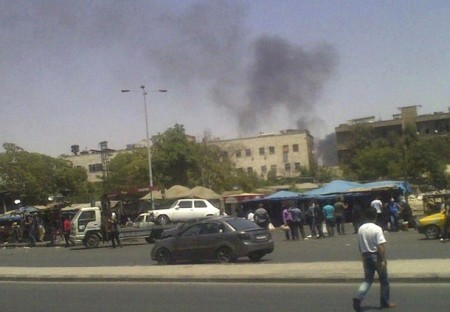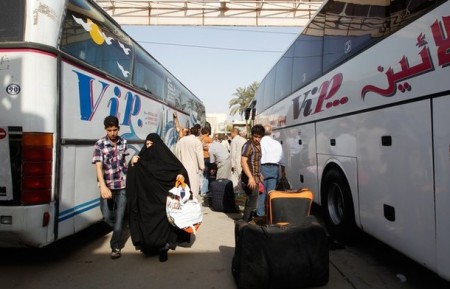'Damascus a Ruinous Heap?' Christians Point to Isaiah 17:1 as Syria Conflict Rages

On the heels of one of the bloodiest days Syria has experienced since fighting broke out last March, the regime of Bashar al-Assad has drawn the line in the sand in the city of Damascus, vowing to wipe out once and for all "terrorist" forces challenging the government. With residents getting a 48-hour warning to flee the capital and state forces promising to use all weapons at its disposal, many are wondering if the world is watching biblical prophecy unfold.
"See, Damascus will no longer be a city but will become a heap of ruins," reads the first verse of the 17th chapter of the prophetic book of Isaiah, believed by scholars to have been written between the late 8th and 7th centuries B.C. Although some critiques argue that the Damascus prophecy was fulfilled in 732 B.C. when the Assyrians leveled the city, others, also pointing to Jeremiah 49:23-27, insist this is an End Times event yet to come to pass.
Olive Tree Ministries shared a commentary on its website earlier this week from prophecy author Jack Kinsella, who expresses the opinion that, based on Scripture, it is quite possible that Syria might look to engage neighboring countries, such as Israel, Iran or Turkey, in the conflict.
Kinsella believes that if Syria uses chemical or biological weapons in an ethnic cleansing campaign, foreign governments would be forced to take military action against Damascus. Such action would prompt Syria to retaliate with military strikes against its northern neighbor Israel. That could eventually lead to a domino effect, with counter-strikes from Hezbollah, Iran, Turkey and perhaps even Jordan, the "The Omega Letter" editor conjectures.
"The prophet Isaiah predicts a quick war between Israel and Damascus, culminating with the total destruction of the city in a single night. In the event of a WMD attack against Israel, the destruction of Damascus would be Israel's only defense against potential annihilation," Kinsella writes.
Conjecturing that if President al-Assad takes such a gamble, Kinsella says he will fail.
"It will be primarily between Syria and Israel, and it will be settled in a single, overnight strike," he concludes, pointing to Isaiah 17:12-14.
Joel C. Rosenberg, a communications strategist and best-selling author of The Last Jihad, The Last Days and similar-themed novels, questioned last month: "Does Bible prophecy foretell the destruction of Damascus?"
"These prophecies have not yet been fulfilled," Rosenberg wrote in June. "Damascus is one of the oldest continuously inhabited cities on earth. It has been attacked, besieged, and conquered. But Damascus has never been completely destroyed and left uninhabited. Yet that is exactly what the Bible says will happen. The context of Isaiah 17 and Jeremiah 49 are a series of End Times prophecies dealing with God's judgments on Israel's neighbors and enemies leading up to — and through — the Tribulation."
Revealing that he was summoned earlier this year to Washington, D.C. by "a prominent Member of Congress" to discuss this very issue, The Damascus Countdown author concluded:
"How exactly will Damascus be destroyed? When will exactly it be destroyed? What will that look like, and what will be the implications for the rest of Syria, for Israel and for the region? The honest answer is that the Bible does not say."
Meanwhile, those on the ground in Damascus and all throughout Syria are bracing for a storm as the battle between rebel and state forces is expected to hit a fever pitch.
"I think what we are seeing today is the beginning of the end," Tariq Saleh of the Revolutionary Leadership Council of Damascus told The Washington Post via Skype on Thursday. "The scenario we fear is that the loyalists will launch revenge attacks on civilians before we witness the fall of the regime." Saleh, speaking from Damascus, said he hoped the fighting would end soon, "with as little bloodshed as possible."

State security, backed by anonymous pro-government militias, have been locked in a renewed, intensive battle with rebel forces in the city of Damascus, where three members of the president's cabinet were killed on Wednesday. Among the top security officials killed by a suicide bomber were al-Assad's brother-in-law and his defense minister. This attack having come so close to home has been touted by some as indication that rebel forces are gaining ground and the regime is on its way out.
However, the government has laughed off such assertions, a representative saying in state-run newspaper Al Bath: "The traitors, agents and mercenaries are deluding themselves if they think that Syria will bow to this strike, even if it hurts."
Instead, the regime has vowed to hit back as hard as possible, after having already being accused of committing innumerable human rights violations in what has been declared by the International Red Cross as a "non-international armed conflict," or civil war.

"The army has so far exercised restraint in its operations, but after the attack, it has decided to use all the weapons in its possession to finish the terrorists off," an anonymous security source told Agence France-Press, which also reported that hundreds of Damascus residents were fleeing after being told by the military that they had 48 hours to escape the on-coming clamp down on rebel forces.
Among the arsenals in Syria's possession is a stockpile of chemical weapons, which the U.S. reportedly fears could potentially fall into the wrong hands or even be used against opposition forces in an ethnic-cleansing effort. Syria is reportedly the only country in the Middle East with such a large collection of chemical weapons.
With anywhere from 10,000 to 14,000 people having died and thousands more displaced since fighting broke out last March, it is feared scores more will be killed and uprooted from their homes, even as Muslims begin their month-long observance of Ramadan, marked by fasting, prayer and reading of the Quran. Syria is predominantly Muslim with Christians being about 10 percent of the population.
Christians have been encouraged by organizations such as Open Doors to use the month of Ramadan to pray especially for the well-being of those facing persecution in Muslim-dominated countries.
A former Syrian army colonel who defected from al-Assad's forces to join the Freedom Syrian Army in Istanbul, told CNN this week that all signs indicate that a major fight was indeed on the horizon.
"The battle for Damascus is coming," he said.





















